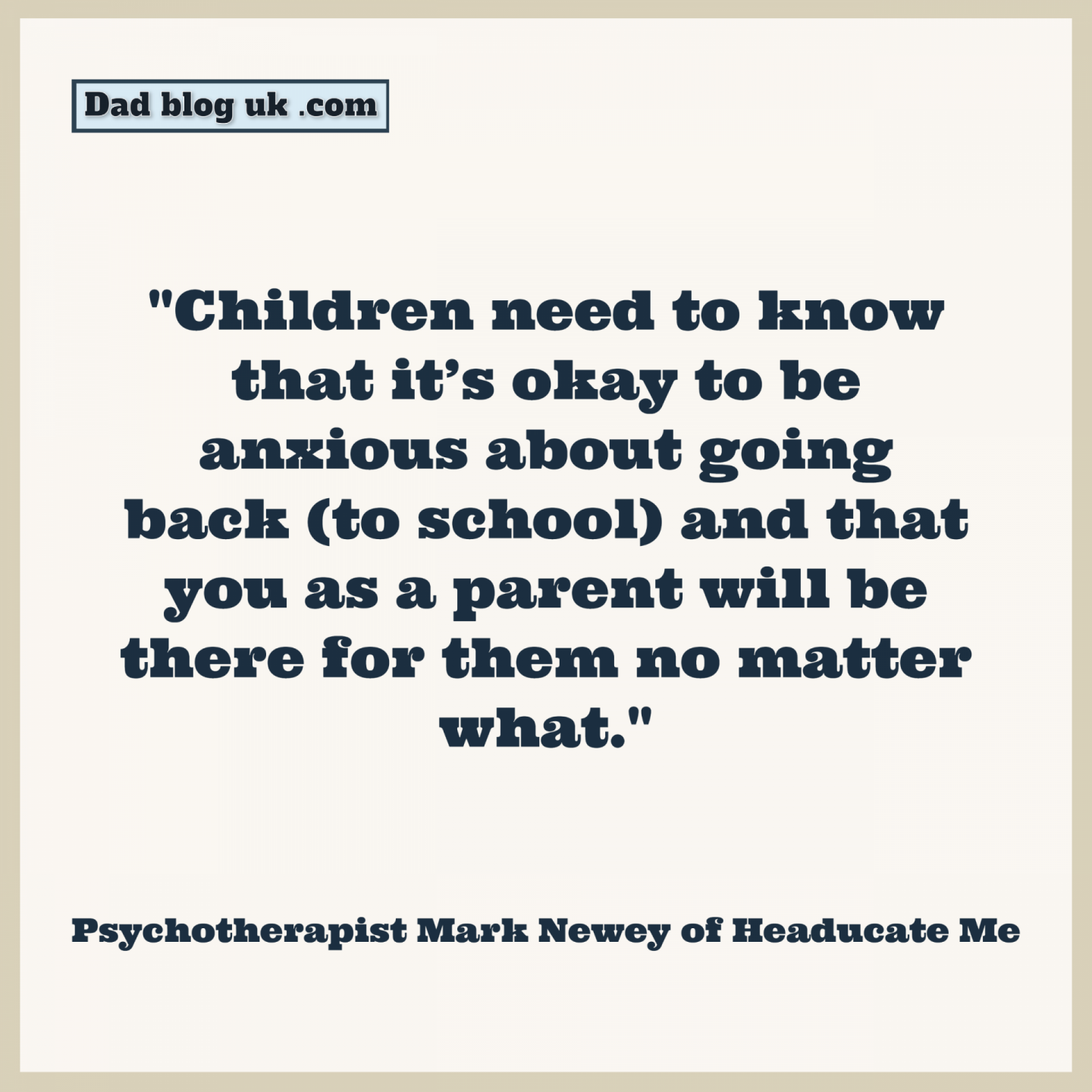Schools in England open en-masse next week. This begs the question: How do you emotionally and mentally prepare your child for the return to the classroom? Psychotherapist Mark Newey of Headucate Me has produced a free, online programme for youngsters called Back to School. As the name suggests, the aim is to help school students transition back to school after lockdown and he’s taken the time to tell me about it.

Following experiences we had last year, I was very keen to find out more about this programme. When the first lockdown was introduced, our eldest daughter, Helen, was in Year Six. This was a priority year group so she and the other Year Six students returned to school in June. She coped reasonably well with the return to school, but I was staggered at the number of friendship issues and other challenges that rapidly developed among her peers. After so long in isolation, it was like taking a lid off a pressure cooker.
That experience made me appreciate the benefits of a programme like the one Mark has put together. I have taken a look at Headucate Me and am working through it with Helen. I encourage you to have a read of what Mark had to say and if you think Headucate Me’s Back to School programme would work for your children, do give it a go.
Mark, can you please introduce yourself and say a bit about your work?
“I had a breakdown over 20 years ago and being curious, I wanted to know why the ‘mess’ was in my head! I started to read books about the mind and suddenly realised that this was what I was here to do. I trained in the neurosciences and set up my own psychotherapy practice and have helped nearly 3000 people beat stress, anxiety and depression over that time. Over the last 5 years, the percentage of people under 23 has gone from 10% to well over 50% and has somewhat changed the direction of my work.
“About 3 years ago, I realised that my work wasn’t therapy, but teaching and coaching: Teaching people how their minds work and how they create their reality on a moment by moment basis, and then coaching them to tailor-make the theory to their own experiences, thinking and behaviours. This has resulted in me now launching a comprehensive online Mental Wellness Education Programme, built on the 20 years’ experience of my own breakdown and the experiences of each of my clients.”

You believe that younger people may face some challenges returning to school. What are the main issues youngsters will face in your opinion?
“There are two big issues that they will face: The pressure to catch up and the sudden reintroduction of relationships that were put on hold for a year.
“Students were already under massive pressure to perform before the pandemic. In fact, there was some interesting research down in 15 secondary schools across the South West, that showed that their anxiety levels went down in the first 2 weeks of lockdown, whilst everybody else’s was skyrocketing! There can only be one reason for that: The ridiculous pressure they were under to perform.
“Now, they will have read online and in the papers about how they’ve lost a year of education and how that will cost them huge sums of money in terms of their earning potential. They will also have read that the powers that be are looking at extending the school day and reducing the summer holiday. That is literally the last thing they need and if introduced, will be a timebomb waiting to go off.
“Secondly, many more of them will be struggling with self-esteem issues and depression as a result of being locked away from their mates for the last year. They need contact with others even more than adults do. After all, isolation is a form of torture! These relationships will not magically reappear when they return to school, as people will have changed over the last year. We have had so little practise in the art of communication that the chances of misunderstandings and fallings out will be much higher.”
You’ve gone as far as to produce a free, online programme for youngsters to help ease them back to school called Back to School. Why is that?
“The Back to School Programme helps them understand the issues they will face, mostly in terms of anxiety and how to handle it. I have done this because all mental health initiatives, whether at school (which are virtually non-existent) or in life, are reactive, not proactive. In other words, we wait until somebody gets very ill and then expect them to put their hand up for help. If we had received mental wellness education, we would be able to foresee the issues coming and prepare for them, so that the damage is minimal. Since neither the medical or educational establishments work this way, I felt the need to step in and help.”

What age of student is the programme aimed at?
“The ideal age is 16-18year olds but any secondary school child will benefit. The presentation will be difficult for primary school children.”
What issues does the Headucate Me Back to School programme address?
“First, I take them through a journey from stress, anxiety and depression through to happiness and joy with all of the stopping off places in between. Then we look at anxiety, teaching them what it is, why it’s an essential part of our system and what to do about it. Next is advice on sleep and meditation to help them take care of themselves. Then we look at the need to rebuild relationships and how to approach that. We then look at identity and helping them find out who they are, as well as an understanding of what emotions are and how they work.”
Should parents work on it with their children, or is it best left for youngsters to complete the programme themselves?
“Parents would benefit from doing the course themselves; however, particularly for teenagers, it is important to allow them to take what they need on their own.
Without wishing to sound repetitive, there is a module focused on rebuilding relationships. After such a disjointed school year and so much of it being spent in isolation, this will be a huge consideration for many youngsters, surely?
“Yes, because picking those relationships will not necessarily be a breeze! The dynamics of individual and group friendships will have changed significantly.
“Unfortunately, the likelihood is that without increased awareness, too many youngsters will be putting a brave face on when inside they’re really struggling. By learning about self-esteem and how relatively easy it is to learn. More aware youngsters won’t need to do that, will be happy with being more open and cope much more easily with the new school environment.”
Do you think older and younger schoolchildren will face different challenges when they go back to school? Older children at secondary school, for instance, face regular COVID tests and must abide by stricter social distancing rules.
“To be honest, there seems to be a huge amount of uncertainty in all of this, partly because different schools will have different logistical problems due to layout. The big difference will be that secondary schools are so much more impersonal due to the number of students; primary schools can remain relatively cozy! Also, primary school children tend to be under less pressure…although the catchup agenda may change that.”
What can parents do to support children returning to school in your opinion?
“The crucial thing in any close relationship is that it is completely open and both parties can say what they need without being judged; we’re talking unconditional love here! The children need to know that it’s okay to be anxious about going back and that you as a parent will be there for them no matter what. It is especially important for the pressure to come off within the parental conversation.”
What do you say to people who don’t believe that digital solutions like this have any value?
“Digital solutions cannot replace therapy but that’s not what they are intended for. The key is that digital solutions can educate in a completely confidential and non-judgemental environment. If somebody is already struggling, then it can not only support them in their therapy work but speed things up. For most of us, we just need to understand what mental wellness actually is and how to get it. This means understanding how our mind works and how we create our reality (including the one we don’t want: Stress, anxiety and depression) and what we need to change to empower ourselves to live a life of fulfillment, which is definitely available to all of us…if only we knew how!”
From a developmental perspective, do you think children might take something positive away from this experience? It has, after all, been an opportunity to learn practical skills, online and etiquette skills, learning resilience and so on.
“Without a doubt! I did a vlog in May last year called The Great Reset. Lockdown has locked us up and forced us to relook at life whether we liked it or not. It’s a reset because we cannot continue to live life as a constant Marathon without rest; modern life has become pretty toxic: Too fast, too pressurised, too demanding, too loud and too damn stressful! The two realisations within the reset are the need to live a simpler, slower life and that connection with others is as important to our wellbeing as food, water and sleep. If young people leaving school can really get that, they are already better prepared for life than their parents’ generation.”
Finally, where can people find out more your work?
“We will be increasingly in the media over the coming months, as we launch our petition for a compulsory GCSE syllabus in Mental Wellness and Emotional Intelligence (we’d love all of your support when it’s launched!) but for now check us out on headucate.me Our vision is to completely change the conversation on Mental Health and spark a revolution in how it is dealt with.”








2 thoughts on “Headucate Me: Back to School mental health post lockdown”
Fantastic interview. I have three children and they have all coped differently but going back to school is causing a great amount of stress. I’m definitely going to check out Mark’s site. Thanks.
That’s great Anne. I hope your children find it useful. After three months apart from peers and face to face lessons, it is bound to be a bit of a shock and some re-adjustment will be necessary.